Settling into team leadership role
Ever since leaving the US Postal team at the end of 2004, Floyd Landis has been working towards...
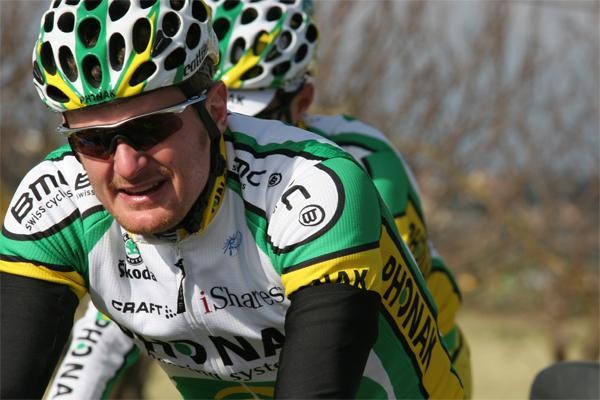
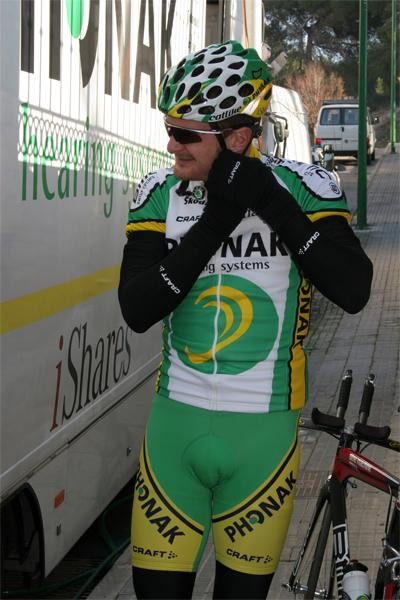
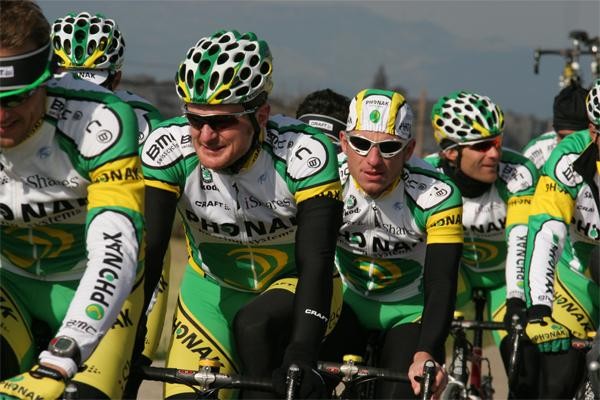
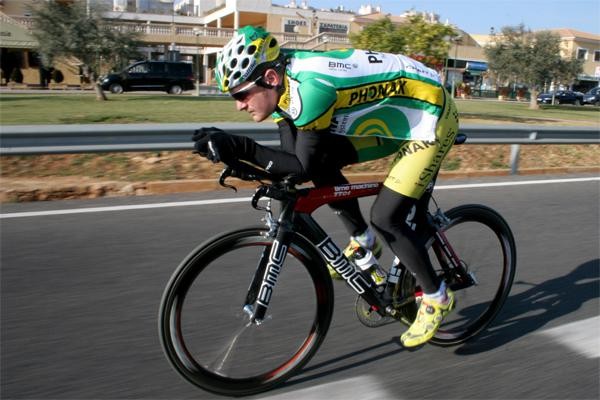
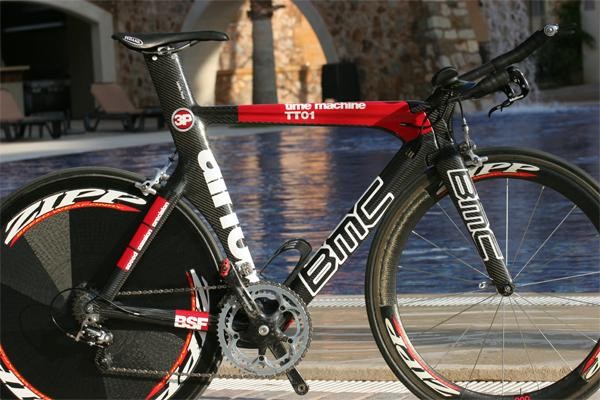
An interview with Floyd Landis, February 16, 2006
Ever since leaving the US Postal team at the end of 2004, Floyd Landis has been working towards emulating the Tour-winning feats of his former leader Lance Armstrong. Cyclingnews' Shane Stokes talked to him at the Phonak pre-season training camp and discovered that he is raring to go in 2006.
This weekend's start to the Tour of California sees Floyd Landis get his season under way on home soil. The 30 year-old is in his second year with the Phonak team and is hoping to step up to a higher level in 2006, with a stronger challenge in the Tour de France his main goal.
Landis was in strong form at the camp, showing good climbing legs in the hills and also a determination to get stuck in and do some high-intensity speed work on the flat. The Tour is still quite a way off but the opportunity to do something on home soil means that he'd like to ride well before then.
Cyclingnews: You looked to be going well today - every time you hit a climb, you took off and left the other guys behind. Are you happy with your form for this time of year?
Floyd Landis: I'm pretty happy. I think I am definitely in better shape this year than I was last year. It is not really necessary to be in shape now, it just happened that way. I mean, I didn't do anything special in the winter; I stayed at home in California, that is enough for me.
CN: Any holidays to get your mind off the bike?
Get The Leadout Newsletter
The latest race content, interviews, features, reviews and expert buying guides, direct to your inbox!
FL: No, not really... I went back to Pennsylvania to see my parents at Thanksgiving. Other than that, I stayed in California. It is hard to leave, the sun is shining there! Anyway, for me that is a holiday, just staying at home there.
CN: What did you do in the off-season to chill out?
FL: I have a family, I have a wife and a daughter, so that takes up most of my time. I don't really have any hobbies other than trying to recover from the season!
CN: Things are better for the team this year, given that 12 months ago you didn't really know what was happening as regards the ProTour and what races you would be riding.
FL: The whole thing was different last year. You can't really compare the two, last year was chaos but this year is a lot better. There is a very different atmosphere now, it couldn't be more different. Last year we didn't know where we stood with the ProTour, with the sponsor. Nothing is ever certain, but as much as you can be in cycling, we are confident about our team this year. I think this year and last year were opposites.
I wouldn't say last year was stressful but there was a bit of tension, some uncertainty. It is definitely better this time around.
CN: I get the impression with Phonak, it is less a case of the management saying " do this, do that," than is the case perhaps in other teams. That the riders take responsibility, that everybody knows what they have to do. In other words, that is perhaps less dictatorial.
FL: Obviously we have a general plan for the races and training. But if you're tired and you need to rest, then you rest. Nobody forces you. And if you want to train more, you train more. It is quite relaxed. I think if you get this far in cycling, everybody knows how to do it...at least on this team. That makes it more relaxed.
I mean, to get this far in cycling you need to have willpower. I don't think it is necessary to whip people [into doing something]! (laughs). I don't think that would go very well with my personality, anyway!
CN: What is your overall assessment on last year?
FL: Overall, I think everything was good. I would change some of the disasters that we had along the way, not the racing part but just the other stuff. But that is part of life. I think we are all probably stronger in the head for it. As far as the races, I think that that after what we went through, not knowing if we would get into the Tour until February, we couldn't have expected much more. I am never satisfied, but I think it would be unfair to say that I was disappointed.
CN: What were the highlights, in terms of your results?
FL: The Tour was a highlight, I think that I did as well as could have been expected. The Tour of Georgia was good, I did some other decent races but it was mostly the Tour. I put most of my energy into that and was happy enough with the way it went.
CN: Did you learn much from the race? It was your first time doing it as the leader of the team.
FL: Yeah, I learned a lot. Obviously it is a process, no matter who you are. It was the first time with that kind of pressure on me. But fortunately on this team, there aren't any real big pressures, just what you put on yourself. But having a team work for you means that you feel more responsibility; they spent their day working for you. I think I am progressing so that is good.
CN: You pulled out of the Vuelta. You had a crash beforehand, but was tiredness also a factor?
FL: Yes, I had no intentions of winning the Vuelta. I was just taking it one day at a time. I was tired, so I didn't want to force it at that point. Nothing good was going to come out of that. That pretty much sums it up.
CN: Have you looked at your buildup to the Tour this year, in terms of what races you will be doing?
FL: Right now, I plan to do California, then Paris-Nice, Criterium International, the Tour of Georgia again. So everything is the same until then. Then, after that, I will probably do the Giro and the Tour. If I do the Giro - and I probably will - it will just be to ride. No other agenda whatsoever. I don't think it would be wise to try to win both. It has happened before, but it is rare. For an American, the only thing that really matters is the Tour; that is the biggest thing in all of cycling. So we will take a risk and gamble on that, I think that is the best thing to do.
CN: There is talk of more big guys doing the Giro than before. Basso did it last year and will try again this time, now there is talk of Ullrich riding it as well. Why do you think more people are doing it as preparation for the Tour - is it to do with the ProTour's emphasis on other races, or is it something totally separate?
FL: Eh...I don't know! It is hard to say. I did notice that a lot of people want to do it. I'm sure it is a hard race - I haven't done it, but they are all hard. My purpose for doing it is for training; if I have a good day and I have an opportunity, I will take it, but otherwise it is for training. I don't know what Ullrich's agenda will be, probably the same. But I don't know why [so many are riding it].
CN: You had a good ride in the time trial in the Tour of Georgia last year and took the jersey there. Presumably you're going to be motivated for that race and also for the Tour of California. Is racing well on home soil an important thing for you?
FL: Yeah, it is definitely good to do well at home. The objective is the Tour, but if those two fit into that plan, then so be it. I should be in decent shape for the Tour of California. The Tour of Georgia finishes a week or 10 days before the Giro, so I don't know - I will see how it works out. I can't promise anything there, but we will see.
CN: You were ninth in the Tour last year, after a bit of an unpredictable buildup and it being your first year as a team leader. Do you have an idea at this point as to what is possible from you in that race in the future?
FL: Possible...? I think it is possible for me to win the Tour. I am not predicting I will win it, but if I get things right and don't get unlucky, anything can happen there. It is three weeks and it is possible that I can win. It is also possible that five, or six, or ten other guys can win. That is what makes it such a great race. But I believe that I can do it, if things go right.
CN: In Daniel Coyle's book Lance Armstrong's War/Tour de Force, it gave a figure for you of seven watts per kilo, in terms of your power to weight measurement. Is that accurate - do you have that sort of figure?
FL: We do those tests and they are always different. I have no idea if they mean anything. In the end, they are fun to look at and you can manage your fitness [by them] but it doesn't replace a race. That is the whole point of a race. It sort of defeats the purpose of a race if you go by tests...hey, if someone is good at testing, just give them the prize. Otherwise, just forget about the race! That is the way I look at it. To be honest, I don't pay much attention to it...a little bit here and there, but I more or less know what I am in shape and what I can do.
What I am trying to say is that you can never take those numbers and predict who is going to win. It doesn't work like that. But it is nice feedback. It is just a way to monitor things, nothing more than that.
CN: I have noticed that your time trial position is quite unique. Nowadays, a lot of guys are pretty stretched out and have low wrist positions. Yours, on the other hand, is quite different. Is that something that evolved through wind tunnel tests, is it a personal preference or where did it come from?
FL: Well, part of the problem is that under the UCI rules, I can't move the seat forward and for that reason, I can't have the bars any further forward. If they could just change the rules, I would just move the seat forward and everything would be the same. But I can't do that, so I have to ride like that.
I don't want to sit back on the saddle, that is the problem.
CN: And it works out well in the wind tunnel?
FL: Yes, very well. I don't look the same [as the other guys] but it works.
CN: It actually looks a bit like Greg Lemond's position, when he won the 1989 Tour.
FL: Yes. It was the best thing that we could come up with.
CN: The Phonak time trial bikes look pretty good. Are you happy with them?
FL: Yes. We have the best TT bikes. For sure. They have spent the most time on them, they are the lightest. Nobody else has a bike like ours.
CN: Did you have much of an input into them?
FL: They made the bike before I got here. So I didn't have an input. But all of our equipment is the best. I am sure of that. So there are no excuses there [in terms of equipment]!
CN: You do a lot of work with Powertap. How does that help you?
FL: I would say that most, if not all, of the pros at this point use some sort of power meter. Ten years ago they used heart-rate monitors, but this is a more consistent number. Once again, this is a personal thing. You can't say 'this should mean that,' 'I should be able to do that,' 'if I can do that I can win the Tour.'
It is a way to monitor your own training. It is very, very effective...it is the best way we have, but it is a personal thing. You can compare data from each day, it is downloadable. It is the best tool that we have, especially to show a coach or someone else what you did, rather than trying to explain to them. It is an actual number. So for that reason, it is very good.
CN: There was talk last year that perhaps the team might continue only for one more season, that if guys had a two year contract [for 2006 and 2007] that they were free to leave if they found something else. Then there was talk that you had discussions with Discovery - was that the case? There had been a bit of tension between you during the season, after all.
FL: Yes. I spoke with Johan a bit. It wasn't anything personal that I didn't go back, it was just that I was happy here. But I am pleased about what happened because some things got blown out of proportion. We had some disagreements but they weren't as bad as they looked.
Fortunately that is fixed. They did ask me to come back and it is a compliment, to say the least. So everything is fine there. Like I said, I didn't say no just out of spite. I would gladly ride for Johan, he is an outstanding director. But I am happy to stay with these guys [Phonak].
CN: I guess it must be a relief anyway, talking things over with Johann Bruyneel. I'd imagine what happened last year with Discovery was stressful, so it must be nice to go into the season with that behind you.
FL: Absolutely. Absolutely.
CN: Looking at Phonak, there seems to be a good atmosphere here. You seem to fit in well.
FL: Yes, absolutely. We have a good group of people. It is hard to get thirty guys who all get along but, so far, so good. Any time you spend a lot of time with people, there can be disagreements. But we are a bunch of reasonable people, a bunch of grownups, so things are going pretty well.
CN: Are you looking forward to the season?
FL: Yes. It is time now. It has been a while since I have raced, so I am excited to be back.
Also see: Inside the Phonak training camp: How the Swiss squad prepare